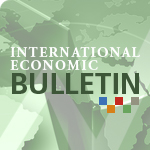The Real Economy: Output, GDP, and Inflation
Hopes of an imminent recovery were damped this week, as mixed economic data cause doubts about the reliability of recent “green shoots”.
The upward turn in U.S. Leading Economic Indicator (LEI) for the first time in a year spurred optimism that the worst of the recession might be over. The New York Conference Board’s LEI increased by 1 percent in April, the biggest gain since November 2005. Improving consumer confidence coupled with significant gains in the stock market has lifted the leading indicator. Yet despite this encouraging sign, housing starts fell by 12.5 percent (m/m) last month, following an 8.5 percent decline in March. This dampened hopes that the housing sector has stabilized and raised concerns that worst is not over yet. Initial jobless claims for the week ending May 16 fell by 12,000 to 631,000. Continuous claims had risen to 6.6 million from 6.5 million by the end of the previous week.
Investor confidence and Purchasing Manager’s Index (PMI) continued to improve in Europe. Germany’s economic sentiment index soared to its highest level in nearly three years in May. The Zew institute’s sentiment index rose to 31.1 from 13.0 in April, and from recent troughs of (-) 63 in August 2008. The index jumped on improving signs the worst of the slump in Europe's biggest economy is over. The Eurozone’s PMI climbed to its highest level in eight months in May to 40.5, up from 36.6 in April. Trade balance moved into surplus for the first time in almost a year, recording a surplus of €400($544) million in March, compared with a deficit of €1($1.36) billion in February. Mean while, consumer inflation remained unchanged at 0.6 percent in April.
In the UK, retail sales rose by 2.6 percent(y/y) in April. Sales increased due to an increase in sales of groceries as well as non-food items. Consumer inflation slowed to 2.3 percent in April from 2.9 percent in the previous month.
The recession in Japan accelerated in the first quarter of 2009.The economy contracted by 4 percent (q/q) and by 15.4 percent on an annualized basis, the fastest pace on record. The steep drop in GDP was caused by a sharp decline in exports, which plummeted by 26 percent (q/q). Business investment in factories and equipment dropped by 10.4 percent from the previous quarter, while consumer spending fell by 1.1 percent.
In emerging markets, the Mexican economy plunged deep into recession as the economy contracted 8.2 percent in the first quarter of 2009 (y/y) after declining 1.6 percent the previous quarter. Brazil’s unemployment rate retreated to 8.9 percent in April, lower than the 9.3 percent anticipated by analysts surveyed by Bloomberg.
Economic Policy
The Bank of Japan kept interest rates unchanged at 0.1 percent last week. The Bank indicated that it would accept sovereign bonds as collateral for loans, in order to make it easier for banks to gain access to cash. However, it did not announce plans to expand the quantitative easing program, despite some signs of growing deflationary pressures.
Brazil announced a plan to offer more 10- and 30-year bonds to international markets this year, in an effort to increase liquidity. The Brazilian government issued $1.8 billion of 10-year bonds in January and May as market conditions improved. Emerging market borrowers issued more than $57 billion in new debt since the beginning of 2009.
Standard and Poor (S&P) changed its medium-term outlook for UK government bonds from 'stable' to 'negative'. S&P is concerned that public debt could approach 100 percent of GDP over the next five years. While reaffirming the UK’s long-term sovereign rating at AAA, the agency will wait until after the next general election before taking further action.
Financial markets
Global equity markets rose only modestly last week on concerns that signs of recovery may be short lived. All three major U.S. stock indices ended slightly higher for the week. The Dow Jones, the NASDAQ and the S&P500 rose by 0.1 percent, 0.7 percent and 0.5 percent, respectively.
In global trading, the UK FTSE 100, the German DAX and the French CAC rose by 0.4 percent, 3.8 percent and 2.3 percent, respectively. In Asia, the Nikkei 225 closed the week down by 0.4 percent.
Longer maturity bond yields rose in the U.S. and UK, with yields for U.S. 10-year notes rising 32 basis points. The decline in U.S. notes’ demand stems from concerns that the mounting budget deficit for this year, which has recently been revised up by 5 percent to $1.84 trillion. The UK 10-year yield rose 18 basis points while Japan’s 10-year notes remain unchanged.
In the foreign exchange market, the U.S. dollar fell to its lowest level this year as investors grew concerned about the U.S. government’s mounting debt burden and the possible inflationary implications of quantitative easing. The dollar slid 3.73 percent to $1.40 per Euro, the biggest weekly drop since March 20 when it plunged 4.8 percent. The dollar fell to $1.59 against the British pound from $1.52 a week ago. The dollar lost 0.5 percent to 94.81 Yen from 95.22.










